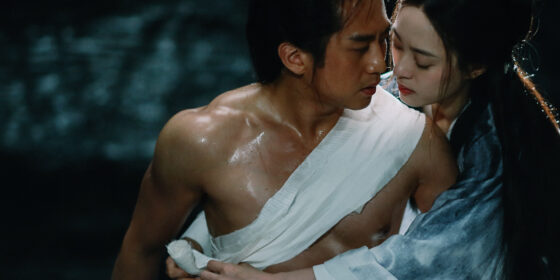Shadow (Zhang Yimou, China) — Gala Presentations
After essaying several genres (period history, period comedy, historical melodrama, international epic) in the last 15 years, Zhang Yimou has returned to something like Hero’s (2002) combination of imperial court and wuxia spectacle. Shadow tones down that earlier film’s concentration on the morality of loyalty to state power in favour of a rather flamboyant but fascinating psychodrama. The action largely takes place in two spaces: the Pei royal court and the city of Jing, captured from Pei by rivals. At the Pei court, a juvenile King (Zheng Kai) is served by military Commander Zi Yu and his shadow Jing Zhou (both played by Deng Chao). The Commander, injured and threatened by court intrigues, is in hiding, and has selected and trained young lookalike Jing Zhou to stand in for him at court and in battle. When the latter rashly provokes Pei’s main rival, General Yang (Hu Jun), to a duel, the interests of two kingdoms clash, and a sneak attack on Jing is mounted as various rivals prepare secret plots and counterplots.
A master colourist, Zhang has set himself an interesting experiment in Shadow: he almost completely abjures the use of colour. Everything is in carefully graded blacks, whites, and greys (shadow colours, in fact), with a few specific exceptions: skin, flames, bamboo, and blood. The art direction combines vaguely pre-Han motifs (though the story is derived from an original story set in the 3rd-century CE Three Kingdoms era), but the set and costume design is largely a spectacularized ancient fantasy China. Costume decoration, in particular, evokes abstracted black ink on paper calligraphy. In the final ferocious third of the movie, red blood begins to dominate: arterial sprays are audible, though perhaps visually toned down in anticipation of censorship requirements? There’s a fascinating and rather fun invention of what one might call “bamboo punk” design in the complex attack weapons Pei warriors deploy in battle, and Zhang and his collaborators have fun with some interestingly playful gender-fluid motifs: the fighting style Jing Zhou and the Commander’s wife (a stellar Sun Li) develop mixes water-drenched feminine circularity (umbrellas are key weapons) with masculine violence. And the final invasion is launched by a troop of umbrella-wielding (and even occasionally hip-swaying) gender-ambiguous male outlaws. One wishes Zhang had made much more of this.
The long coda, though, returns to intensified court tragedy, and probes more deeply into the implications of shadowing, of the mutual necessity and mutually assured destructiveness of doubles without an original. One wonders if perhaps Zhang might be exploring allegorically, perhaps subconsciously, the structure of the complex personas he’s adopted throughout his own career as art-film and commercial-film director, producer, and state pageantry designer. Might the mirror selves he has created and sustained both require each other in order to exist, and demand each other’s continued symbolic annihilation at the same time?
Shelly Kraicer



